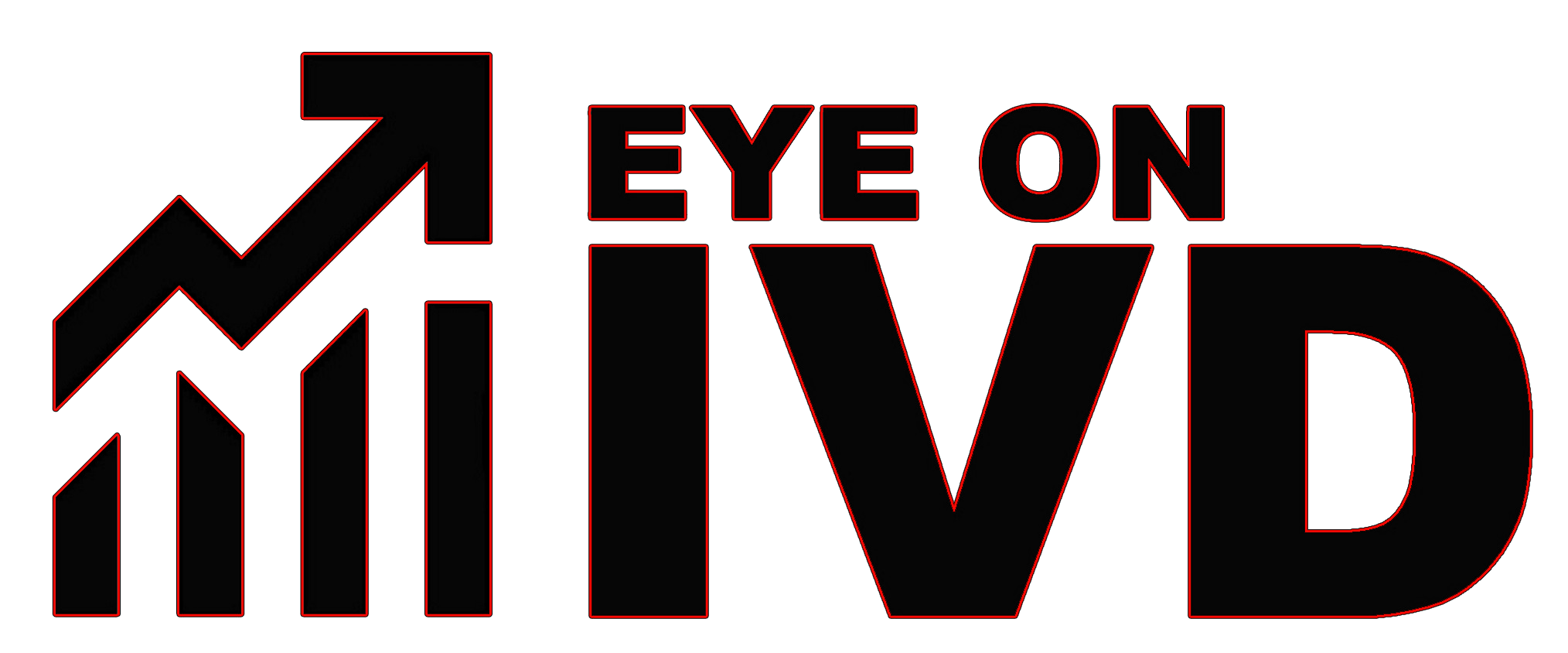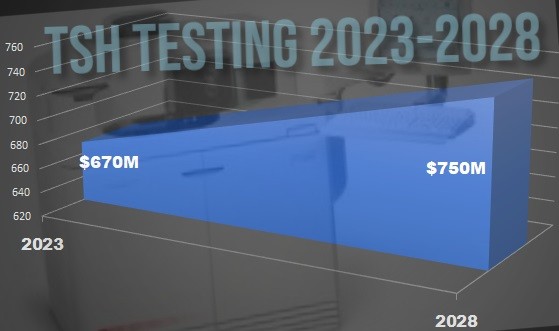Improper thyroid function is important to detect, as it can lead to issues with heart rate, mood, energy level, metabolism, bone health, pregnancy and many other functions. The most common way to to test thyroid function is to find levels of the hormone regulated by the pituitary gland, TSH (thyroid-stimulating hormone).
TSH tests are useful. Thyroid hormones exert influence over almost every organ, including the heart, governing weight, body temperature, muscle vigor, and emotional state. Insufficient levels of thyroid hormones in the bloodstream can slow body functions and the reverse is true as well. TSH is a blood test, is common on analyzer systems, and is run as part of other routine tests.
For this reason, TSH is one of the most frequently-run tests, and you can see evidence of that on the business side. Our upcoming IVD Market Book will call the market for TSH at over $600M, growing at a 2.4% rate next five years. (The category includes a few type of tests, but lion’s share is TSH). This is not surprising, as TSH is performed on healthy populations and is a monitor as well as a detector test.
CAP Today Article on TSH
What could be wrong with people getting a useful test? Well, as an article in CAP Today (https://www.captodayonline.com/digging-into-the-interpretation-of-tsh-results/) describes, TSH is so frequently tested for that the simple law of averages indicates it will be misinterpreted in some amount of cases. This could be leading to overdiagnosis and overprescriptions of thyroid replacement therapy (most commonly levothyroxine) for hyopthyroidism.
“the more you test, the more you find”
As an interviewee physician in the CAP Today article states in the quote above, volume comes at a price: more testing means that you will find more results.
So what? Shouldn’t it be not a problem to find more cases of disease? What’s wrong with more testing? Nothing at all. There should be more testing for a lot of conditions. But any increase in volume of testing does change some dynamics.
Volume distorts the image we may have in our heads of a single patient and a single test. Running tests in a large, diverse population can disrupt the way healthcare providers interpret results. This is because, single scores or reference intervals are used. It’s high or its low. For TSH, higher than 5 mIU/L (milli-international units per liter) is seen as indicative of too little production.
That’s useful to know, and we can’t assert enough here that TSH is a useful test. But while a single score may seem straightforward in categorizing results as “good or bad,” it oversimplifies the complexity of human health. Blindly adhering to reference intervals, which dictate what’s considered normal or abnormal, can lead to suboptimal health decisions, as it is in the end of the day applying one standard to millions of individuals.
For instance, there’s growing concern that reference intervals for TSH might not be suitable for elderly individuals.
To address this, there’s a few things labs and providers could do.
- consider factors like age or race, and other diseases.
- Tests should be conducted under various conditions (fasting vs. non-fasting) and complemented with other diagnostics prior to final diagnosis and prescription.
- Labs might, though this is not common practice, provide provider with a z-code, a measure of deviation from norms rather than a fixed score. A deviation can provide more nuance in close cases.
Mayo Clinic Study of Thyroid Therapy Patients
When these extra considerations are not taken, you can have more identified disease than is probably present, and over prescription. It’s happened according to a Mayo Clinic study.
In 2021, Juan P. Brito Campana, M.B.B.S. at Mayo Clinic studied over 58,000 insurance clams involving levothyroxine, the main drug for replacement therapy. He looked for cases all of the United States and over a ten-year period. He found that in at least 30 percent of cases, TSH levels were normal and the prescriptions may have been hasty. Another 60 cases were what were called ‘sub clinical’ divergent from reference intervals but not as far as a pure disease state. The study concluded.
“We found that levothyroxine treatment was commonly initiated for mildly increased thyrotropin levels, and this did not change significantly over time. Among patients for whom full thyroid function test results were available, 60% initiated levothyroxine for treatment of subclinical hypothyroidism (mostly for mild subclinical hypothyroidism) and 30% for normal thyroid function, without significant change in these patterns over time.
“Frequent initiation of levothyroxine in these patients is at odds with evidence demonstrating no significant association of levothyroxine replacement with measures of health-related quality of life, thyroid-related symptoms, depressive symptoms, fatigue, or cognitive function.”
What is the solution to the volume problem the Mayo Clinic found? It might be odd to say it given the amount of time I just talked about the trouble with testing in volume, but more testing may be the answer. But testing in combination with TSH.
Testing for other markers in combination for TSH, could help. A host of tests can determine thyroid function. Everything from antibodies for specific conditions, to indexes that demonstrate how advanced disfunction might be. Thyroid peroxidase antibody, (TPO,) anti-TPO, antithyroid microsomal antibody, thyroid- stimulating immunoglobulin, TPO is a protein enzyme produced by the thyroid gland to create hormones that regulate metabolism and growth. When thyroid cells are damaged and TPO enzymes leak into the bloodstream, the immune system produces antibodies to fight them If tests of your thyroid hormone levels show that your thyroid isn’t working properly, your provider may order thyroid antibody tests to see if an autoimmune disease is causing the problem. Thyroglobulin antibodies (TgAb). High levels of these antibodies are a sign of Hashimoto’s disease. Thyrotropin receptor antibodies (TRAb). These antibodies can be a sign of Graves’ disease.
Many companies make TSH products and other thyroid tests, including:
- Siemens Healthineer’s ADVIA Centaur runs TSH tests, and also a full menu of thyroid testing.
- Roche Elecsys Anti-TSHR and Elecsys TSH, among others.
- Beckman Coulter/Danaher Access TSH assay
- True Diagnostics TrueDX TSH test
- Abbott Alinity i
- Quidel Ortho VITROS test
- Everlywell’s Home Test
- CTK TSH FIA Test
- biomerieux VIDAS TSH Test
- Thermo TSH Sandwich ELISA
This CAP Today article goes into much more detail: https://www.captodayonline.com/digging-into-the-interpretation-of-tsh-results/
If you think Eye on IVD would be of use to a colleague, recommend it. Thanks. We will be also releasing market research products for sale soon.


